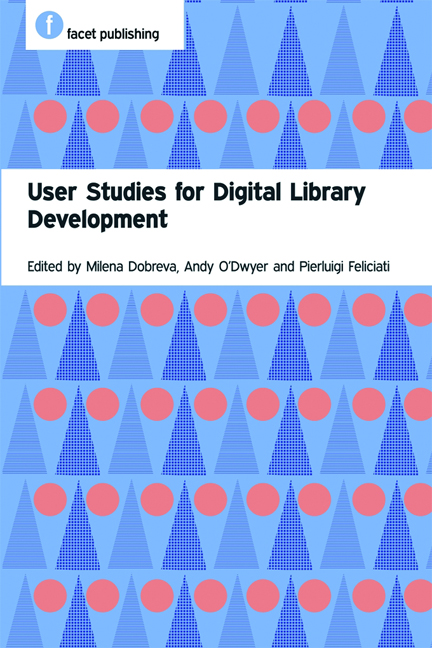Book contents
- Frontmatter
- Contents
- Preface
- Acknowledgements
- Abbreviations
- Glossary
- 1 Introduction: user studies for digital library development
- PART 1 SETTING THE SCENE
- PART 2 METHODS EXPLAINED AND ILLUSTRATED
- PART 3 USER STUDIES IN THE DIGITAL LIBRARY UNIVERSE: WHAT ELSE NEEDS TO BE CONSIDERED?
- PART 4 USER STUDIES ACROSS THE CULTURAL HERITAGE SECTOR
- 18 User studies in libraries
- 19 User studies in archives
- 20 User studies in museums: holding the museum in the palm of your hand
- 21 Digital art online: perspectives on user needs, access, documentation and retrieval
- 22 User studies for digital libraries’ development: audiovisual collections
- 23 A business-model perspective on end-users and open metadata
- PART 5 PUTTING IT ALL TOGETHER
- Index
18 - User studies in libraries
from PART 4 - USER STUDIES ACROSS THE CULTURAL HERITAGE SECTOR
Published online by Cambridge University Press: 08 June 2018
- Frontmatter
- Contents
- Preface
- Acknowledgements
- Abbreviations
- Glossary
- 1 Introduction: user studies for digital library development
- PART 1 SETTING THE SCENE
- PART 2 METHODS EXPLAINED AND ILLUSTRATED
- PART 3 USER STUDIES IN THE DIGITAL LIBRARY UNIVERSE: WHAT ELSE NEEDS TO BE CONSIDERED?
- PART 4 USER STUDIES ACROSS THE CULTURAL HERITAGE SECTOR
- 18 User studies in libraries
- 19 User studies in archives
- 20 User studies in museums: holding the museum in the palm of your hand
- 21 Digital art online: perspectives on user needs, access, documentation and retrieval
- 22 User studies for digital libraries’ development: audiovisual collections
- 23 A business-model perspective on end-users and open metadata
- PART 5 PUTTING IT ALL TOGETHER
- Index
Summary
Introduction
As long ago as 1981 the doyen of British information researchers, Tom Wilson, stated:
Apart from information retrieval there is virtually no other area of information science that has occasioned as much research effort and writing as ‘user studies’. Within user studies the investigation of ‘information needs’ has been the subject of much debate and no little confusion.
(Wilson, 1981)This remains true when we look at the division between traditional and digital libraries (DLs). In truth there are very few true DLs with digitalonly content, hybrid libraries with a mixture of resources in all media being much more the norm. And in both digital and hybrid libraries the majority of content consists of digitized versions of existing content rather than borndigital content. Even borndigital content such as journal articles or theses will tend to exist in printed form as well. The interesting question that then arises is how the use of digital tools will allow 1) much better understanding of the ways in which traditional, paperbased libraries are used and 2) a comparison of how they support users, as compared with hybrid and DLs. Although users still tend to think of libraries as collections of books, research has shown that they also value support from librarians in their informationseeking practice. The biggest and longestrunning collection of data about university libraries in the UK is the SCONUL annual statistics, which show how the usage of libraries has changed over almost 20 years. Similar data exists for other countries. This data allows some analysis to be made of how library usage is changing. This chapter gives examples of how user and use studies can add to understanding of the library and its role.
User studies
A major change in how libraries and library services are planned and managed has been a shift to evidencebased practice as a tool to support decision making. This first started in medical libraries over a decade ago, but has become a standard approach that is even taught at library school. Using research to support effective library decision making should become part of daily practice to help library managers learn more about their work, to develop better services and to share ideas about best practice. It helps to build a body of professional knowledge that can benefit the entire profession.
- Type
- Chapter
- Information
- User Studies for Digital Library Development , pp. 191 - 198Publisher: FacetPrint publication year: 2012



